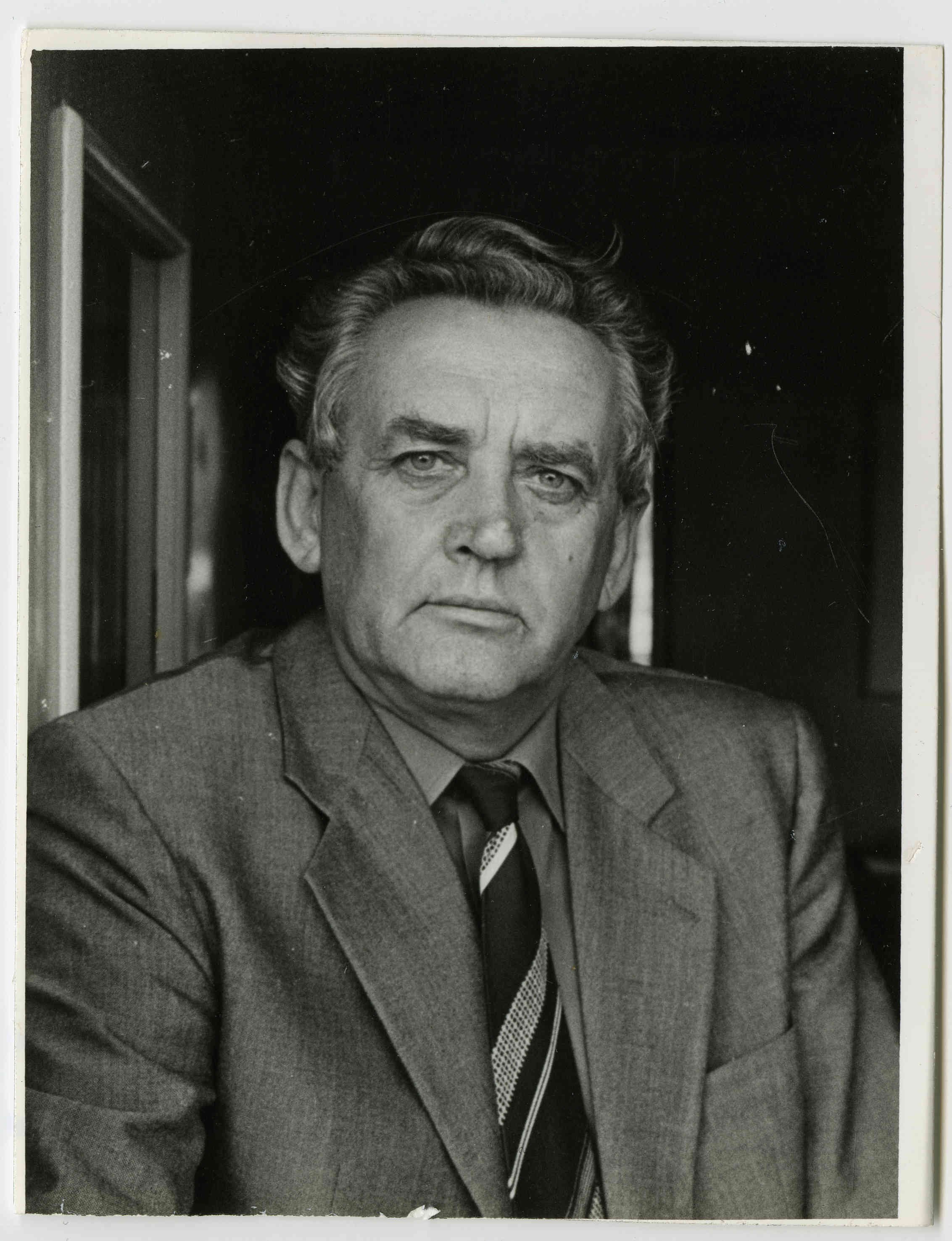
Albert Uustulnd
Albert Uustulnd (6. XI 1925 – 9. VIII 1997) was a prose writer and playwright.
He was born on Saaremaa, educated at Vätta and Kuressaare. He was mobilized into the German army, from which he escaped and spent time in a Soviet prisoner-of-war camp. In 1948 he graduated from Kuressaare secondary school, and in 1954 from the faculty of economics at the Tallinn University of Technology. He worked as a fisherman, as a building site foreman and in many other posts. He died in Kuressaare, and was buried in Kudjape cemetery.
The career of the popular author began with plays; in 1948 Sirtsu soo (‘Sirtsu Marsh’) was staged at the secondary school in Kingissepa (Soviet-era name for Kuressaare). He began publishing short prose in 1953. He achieved greater recognition with plays on the subjects of coastal life and fishermen (such as Traalid udus – ‘Trawlers in the Fog’ – staged 1960; Mere peremehed – ‘Masters of the Sea’ – staged 1961; Vana paat – ‘The Old Boat’ – staged 1962; Kaugused kutsuvad – ‘Distances Are Calling’ – staged 1967; Neptuni pärijad – ‘Heirs of Neptune’ – staged 1969; Naistele mehed, meestle meri – ‘Men for Women, the Sea for Men’ – staged 1980). The colourful gallery of characters, the demotic use of language and the humour are striking. He has also written radio plays on maritime themes.
A more substantial part of his work is composed of novels, which likewise basically concentrate on the lives of island and coastal people. Here one encounters an expert creation of atmosphere, and colourful types among the coast-dwellers and fisherfolk. Greater weight is placed on plot development than on deep psychological insights. The problems of creating a kolkhoz collective are the focus of the novel Meri põleb (‘The Sea is Burning’, 1969); the problem of alcoholism, which rears its head in the world of Soviet fishermen is dealt with in Meri, mehed ja jumalad (‘The Sea, Men and Gods’, 1980). Uustulnd’s major work is the series of novels Tuulte tallermaa (‘Battlefield of the Winds’: I 1985, II 1990, first volume of part III Lummav meri – ‘The Enchanting Sea’ – 1994; second volume Rajud ei rauge – ‘The Storms Don’t Abate’ – 1994; first volume of part IV Tormid ei taltu – ‘Tempests Are Not Tempered’ – 1996; second volume Hullunud meri – ‘The Sea Gone Mad’ – 1996; part V Ohtlikud hoovused – ‘Dangerous Currents’ – 1998). These realistic novels depicting life on the littoral encompass the period from the end of the 19th century to the end of the Second World War. Part I won 3rd prize in the 1985 novel competition and the Vilde Kolkhoz prize. The fortunes of young Estonian men in the Second World War are portrayed in the novel Acheroni kaldal (‘On the Shores of Acheron’, 1991), in which, apart from adventures of a Švejk-like nature, the grimness of the world of the prison camps is revealed. The novel won 3rd prize in the 1990 novel competition.
He is also the author of many song lyrics and ballads; a selection of his work appeared in the collection Laule (Songs, 1985).
A. K. (Translated by C. M.)
Books in Estonian
Novels
Meri põleb. Tallinn: Eesti Raamat, 1969, 315 lk.
Avali väraval. Tallinn: Eesti Raamat, 1977, 208 lk.
Meri, mehed ja jumalad. Tallinn: Eesti Raamat, 1980, 286 lk.
Tuulte tallermaa. Tallinn: Eesti Raamat, 1985, 335 lk. [2. tr 2010.]
Lambeti graafik. Tallinn: Eesti Raamat, 1987, 157 lk.
Tuulte tallermaa 2. Tallinn: Eesti Raamat, 1990, 364 lk. [2. tr 2011.]
Acheroni kaldal: autobiograafiline romaan. Tallinn: Eesti Raamat, 1991, 286 l.k [2. tr 2015.]
Lummav meri. [Tuulte tallermaa III 1. rmt.] Tallinn: Eesti Raamat, 1994, 172 lk. [2. tr 2011.]
Rajud ei rauge. [Tuulte tallermaa III 2. rmt.] Tallinn: Eesti Raamat, 1994, 197 lk. [2. tr 2011.]
Kui jumalad nutsid. Tallinn: Eesti Raamat, 1995, 127 lk.
Tormid ei taltu. [Tuulte tallermaa IV 1. rmt.] Kuressaare: G. Trükk, 1996, 191 lk. [2. tr 2012.]
Hullunud meri. [Tuulte tallermaa IV 2. rmt.] Kuressaare: G. Trükk, 1996, 207 lk. [2. tr 2012.]
Rannavälja. Kuressaare: G. Trükk, 1997, 197 lk.
Ohtlikud hoovused. [Tuulte tallermaa V.] Kuressaare: Tormikiri, 1998, 216 lk.
About Albert Uustulnd
Elu nagu looming & Acheroni kaldal. Toim A. Sihvart. Tallinn: Kadmirell, 2015, 351 lk.



